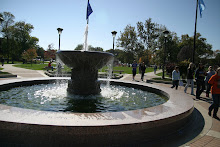by Hadeiyah Ameen
Eight Marian biology students accompanied by three staff members went on their second “on location” lab trip to Puerto Rico. Their first lab trip was in the spring of 2010 when they traveled to Pensacola, Florida.
According to Dr. Ron Weiss, Assistant Professor of Biology, “the students were encouraged to observe the various marine habitats, conservation issues, and management of marine resources such as coral reefs.”
They visited the University of Puerto Rico, where they received a lecture about marine life of Puerto Rico and the importance the coral reef ecosystem. Graduate students from the University of Puerto Rico took the Marian students to a sand bar to observe different specimen.
They were able to hold and interact with an octopus, starfish, and sea cucumbers. At Mangrove Island, established
by the growth of mangrove trees, the university students discussed the succession of the island’s ecosystem
and physiology of plant life. They also traveled to a bioluminescent bay, an area containing glowing phytoplankton species.
“Students discussed different aspects that must be present in order for the ecosystem to come into, and remain in existence,” said Weiss The students visited many more places, including the Karst Cave system and the tropical rainforest habitat that covers the central mountains of the island. They witnessed the temperate and dry scrub
forest habitats and learned how the mountain topography interacts with the ocean ecosystem to create various land forms and habitats, as Weiss explains.
“Everything about the island is so laid back and slower moving than back here. It was really nice to get out of the fast paced atmosphere of the city and school and just relax with the locals and take everything in,” said Sarah Grimes, a sophomore biology major.
Grimes detailed snorkeling in one of the coral reefs, boating in the Caribbean for exploration of animals, and the tours of the historic sites.
Marian University is considering partnering with other countries to expand locations of possible Marine Biology lab trips. Some of the countries being looked into are South Africa, Australia, Bahamas, and Panama.
According to Weiss, they plan to develop a separate course possibly titled “The Biology of Distant Areas.” For students like Grimes who are majoring in Biology but are unsure of their focus, this field of study presents many options.
The study of marine biology can lead to careers with local and state governments and Federal Agencies. During the trip to Puerto Rico, Grimes learned a lot about the animals and their environments “in a way that you just can’t do in class.”
She also learned that she loves Puerto Rico and is “going back as soon as I can."
skip to main |
skip to sidebar

The Knight Times is a student newspaper dedicated to serving the Marian University student community. Our goal is to inform the Marian community on campus, local, and global issues. We strive to report the stories that matter and take student opinions and comments into consideration. We want you to read, comment, and enjoy!
Welcome to

- The Knight Times
- The Knight Times is a student newspaper dedicated to communicating campus, local, and global issues to the Marian University student community. We want you to read, comment and enjoy!
Photos Taken By:
Michael Schrader
David Leszcynski
Michael Schrader
David Leszcynski
Blog Archive
-
▼
2012
(28)
-
▼
April
(13)
- Student government elects new officers
- Marian goes global
- Cycling: a global sport
- German students meet Eva Kor, Holocaust survivor
- Anatomy of the crucifixion
- Biology students study in Puerto Rico
- Nursing students serve in Honduras
- Shoeless students stir debate
- Marian: Building Bridges, Med school
- First Show Choir initiated at Marian
- Bird watching tours in the EcoLab
- Speaking Center opens doors
- Simon Bruté Lecture 1st Annual Lecture
-
▼
April
(13)
Stay Tuned for our NEXT Issue...
February 24 2012